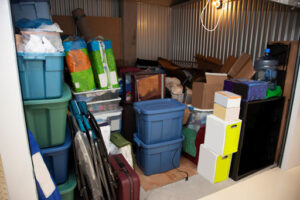How to Prep Your Belongings for Storage
Whether you’re storing items long-term or temporarily during a move, proper preparation is crucial to maintain your items’ condition over time. Use the information here to help you safeguard your belongings against damage or theft while in storage.
 Understanding the Storage Process
Understanding the Storage Process
Before you begin, find out what you can and can’t store. After all, not all items are suitable for storage, including combustible and perishable items. Contact your provider to confirm what you’re allowed to keep in a storage unit.
Next, decide what personal items to tuck away. You have limited space, so don’t store things “just in case.” The key is to only hold onto items you genuinely need or that have sentimental value. To save money on storage space, consider selling, donating, or recycling items you haven’t used in over a year.
Effective Packing and Preparation
Cleaning your items before storage is highly recommended to help prevent damage, maintain the items’ condition, and deter pests. Each item should be cleaned appropriately. For instance, clothes should be laundered, appliances should be emptied and dried thoroughly, and furniture should be vacuumed or wiped with an all-purpose cleaner.
As for proper packaging techniques, opt for plastic bins over cardboard boxes. They stack better, are waterproof, and deter pests more effectively. Wrap delicate items in packing paper or bubble wrap for added protection. Finally, label each bin to save time when looking for specific items.
Inventory Creation and Organization
It’s easy to forget what you have in storage, especially if you keep items tucked away long-term, so create an inventory you can access from anywhere. This helps you track your belongings and is important for insurance purposes. Even if you make a digital list, keep a hard copy in your storage unit to reference, add, and mark off items as needed.
Organizing items for easy access within your storage unit is also crucial. Store heavier items on the bottom and lighter boxes on top to prevent damage. Also, keep things you need to access regularly near the front of the unit.
Storing Electronics
Apart from cleaning your electronics thoroughly, remove any batteries to avoid leaks and damage. Store large electronics like televisions and computers in their original boxes if you still have them. If the original packaging isn’t available, use sturdy boxes and bubble wrap or packing paper as a cushioning material. Climate-controlled storage is a must to protect electronics from moisture and temperature fluctuations.
Storing Clothing and Textiles
Clothes, bedding, towels, and other textiles take up considerable space in your storage unit. Vacuum-sealed bags are great for saving space and protecting clothes at the same time. However, this technique might damage certain materials like fur or leather. Use garment bags and wardrobe boxes for these and other items that need to breathe. Also, avoid hangers for long-term storage to prevent stretching. Instead, fold clothes neatly and place them in plastic bins.
Storing Furniture
Furniture can be tricky to store because of its size and the different materials involved. If possible, disassemble large furniture pieces for easier transportation and storage. Keep all screws, bolts, and other small parts in labeled bags taped to their corresponding furniture items. Vacuum, spot clean, and thoroughly dry furniture before storage. Protect upholstered items with furniture covers or moving blankets.
Climate Control and Security Considerations
If you’re storing items that may be affected by temperature or humidity changes—such as electronics, artwork, or documents—consider finding a climate-controlled storage facility. Climate-controlled storage benefits include protection from heat damage, cold temperatures, mold growth, and dust.
Security is another important consideration. Make sure your storage provider offers strong security measures, such as 24/7 video surveillance, secure locks, and access control features.
The Importance of Insurance
While preparing your items for storage and selecting a secure storage facility help safeguard your belongings, storage insurance is equally crucial for financial protection should your items get damaged or lost. Some homeowner’s or renter’s insurance policies cover stored items, but you should confirm this with your insurance provider. If the coverage is insufficient, consider obtaining separate storage insurance.
Reliable Storage Services in Chicago, IL
When you’re ready to store your belongings, turn to Midway Moving & Storage for convenient, secure, and affordable storage services. We offer more than just a place to store your stuff—we provide peace of mind. With climate-controlled units, top-tier security, and an experienced team dedicated to safeguarding your belongings, you can trust us for all your storage needs.
Choose from multiple solutions, including full-service storage, where we pick up your belongings, professionally pack your storage unit, and return your items upon request. It’s the simplest, most convenient storage option in Chicago, IL. Contact us at 800-300-0002 today to request your quote for a seamless storage experience.

